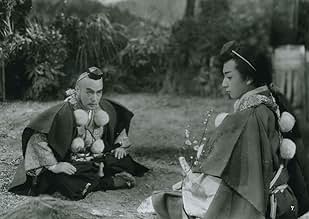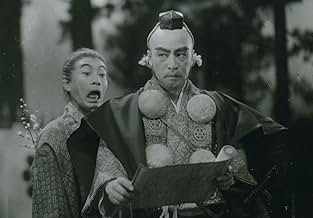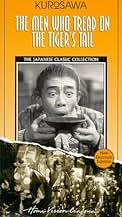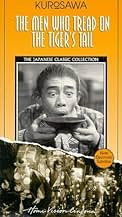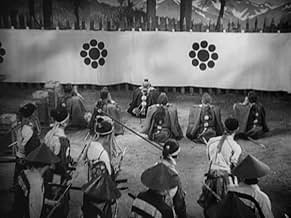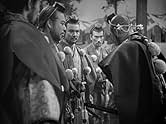IMDb-BEWERTUNG
6,7/10
4713
IHRE BEWERTUNG
Ein japanischer General und seine Männer verkleiden sich als Mönche, um an einer feindlichen Grenzpatrouille vorbeizufahren.Ein japanischer General und seine Männer verkleiden sich als Mönche, um an einer feindlichen Grenzpatrouille vorbeizufahren.Ein japanischer General und seine Männer verkleiden sich als Mönche, um an einer feindlichen Grenzpatrouille vorbeizufahren.
- Regie
- Drehbuch
- Hauptbesetzung
Empfohlene Bewertungen
This is a very intelligent movie, telling the story of two men who ride the tiger's tail out of loyalty and grace. The courage of one of them is explicitly portrayed in the film. It is the samurai Benkei who cleverly defends his lord at a very high personal risk. Benkei improvises an eloquent speech reading out of a blank scroll the prospectus for the temple when required to do so by the commander of the military outpost seeking to capture his master. Benkei uses logic to convince his comrades that it is not a good idea to fight the soldiers of the barrier. The samurai may kill all the soldiers this time but that will result in more soldiers and more persecution later on. Benkei uses a clever trick, to flog his master who is posing as a porter when the second-in-command suspects that the porter is the master they are trying to capture. Since a servant would never beat his master, the porter cannot be the master, reasons the top commander.
But more impressive than Benkei is the street-wise guy, the real porter played by Kenichi Enomoto, who joins the party of samurai in the forest. He treads on two tigers' tails. The first tiger is represented by the party of samurai. He is rejected by them, he is called a nobody, he is treated harshly, he is even threatened with death. He disappears at times but he returns to help the samurai who walk in the forest pretending to be itinerant priests. He collects information valuable to them and shares that information. And the second tiger is the military outpost who will surely kill him if they discover that the master is among the party of fake itinerant priests.
While Benkei does his heroic deeds in a ceremonial manner framed by rituals and high tension, the loquacious porter does his heroic deeds in a discreet, even awkward manner, without fanfare or rituals. His heroism is so discreet that even seasoned Kurosawa critics missed the point of the movie: natural, humble heroism offered not out of loyalty, but out of grace.
(The master of the party of samurai is such an obscure figure that out of respect to Kurosawa I have not even mentioned his name in my review)
But more impressive than Benkei is the street-wise guy, the real porter played by Kenichi Enomoto, who joins the party of samurai in the forest. He treads on two tigers' tails. The first tiger is represented by the party of samurai. He is rejected by them, he is called a nobody, he is treated harshly, he is even threatened with death. He disappears at times but he returns to help the samurai who walk in the forest pretending to be itinerant priests. He collects information valuable to them and shares that information. And the second tiger is the military outpost who will surely kill him if they discover that the master is among the party of fake itinerant priests.
While Benkei does his heroic deeds in a ceremonial manner framed by rituals and high tension, the loquacious porter does his heroic deeds in a discreet, even awkward manner, without fanfare or rituals. His heroism is so discreet that even seasoned Kurosawa critics missed the point of the movie: natural, humble heroism offered not out of loyalty, but out of grace.
(The master of the party of samurai is such an obscure figure that out of respect to Kurosawa I have not even mentioned his name in my review)
I have watched this several times and enjoyed each viewing. It's a very early Kurosawa, apparently done on a shoestring of a budget. However, we can already see Kurosawa's talents in pacing and setting up shots. Kenichi Enomoto as the porter appears out of place at first with his over the top mannerisms and broad comedy, but he fits into the story and breaks up the slower pace of some of the scenes. For Kurosawa and samurai fans, I think this will be more than just a curiosity. This has an early appearance of Masayuki Mori (the murdered husband in Roshomon) and a fairly early appearance of Takashi Shimura (leader of the seven samurai). I recommend this for the usual suspects.
I chose to watch this on the way home from a trip where Japanese heritage was central. I have saved this early Kurosawa for such a special occasion, knowing that it would be heavily stylized. I thought that would detract from the effect; surely that is what most commentors say.
Cinematically, this has the essential Kurosawa: layered staging, profound cosmic forces testing human resources and strong character extremes.
The central character is disowned royalty, determined to set things right. We see little of him, and not even his face until things are nearly over.
I believe that it is Kurosawa's intention that he be the watcher and motivator both. As our on screen surrogate, this places us as both the watcher and the governing truths. It is a very clever reversal of the tradition, strong even then and even in Japan. The reversal is overt: he/we displace a comic porter, a simpleton that in a slightly less modern story would be the watcher.
He does watch, but as the thing evolves, he becomes more and more a featured act. Coming at the beginning of Kurosawa's career, it is tempting to think of this as paired with "Ran," the fool of the beginning to the King Lear of the end. This fool is not wise, but he is present in a way that no one else is, allowing us to carry the film.
The "film within" in this case is an impromptu prospectus for a rebuilt temple. I know of no more dramatically effective sequence than this, witnessed by an honorable man who takes the blessing seriously, and a foppish villain who creeps around during the speech. These are the fundamentals. As time would go, he could work with something better than a two-layered sound stage, and more complex narratives than this simple vignette. But I think the soul and sound of this is every bit as good as his best.
Ted's Evaluation -- 3 of 3: Worth watching.
Cinematically, this has the essential Kurosawa: layered staging, profound cosmic forces testing human resources and strong character extremes.
The central character is disowned royalty, determined to set things right. We see little of him, and not even his face until things are nearly over.
I believe that it is Kurosawa's intention that he be the watcher and motivator both. As our on screen surrogate, this places us as both the watcher and the governing truths. It is a very clever reversal of the tradition, strong even then and even in Japan. The reversal is overt: he/we displace a comic porter, a simpleton that in a slightly less modern story would be the watcher.
He does watch, but as the thing evolves, he becomes more and more a featured act. Coming at the beginning of Kurosawa's career, it is tempting to think of this as paired with "Ran," the fool of the beginning to the King Lear of the end. This fool is not wise, but he is present in a way that no one else is, allowing us to carry the film.
The "film within" in this case is an impromptu prospectus for a rebuilt temple. I know of no more dramatically effective sequence than this, witnessed by an honorable man who takes the blessing seriously, and a foppish villain who creeps around during the speech. These are the fundamentals. As time would go, he could work with something better than a two-layered sound stage, and more complex narratives than this simple vignette. But I think the soul and sound of this is every bit as good as his best.
Ted's Evaluation -- 3 of 3: Worth watching.
In 1185, the Seike family fights against the Minamoto family. After a bloody naval battle in the Pacific Ocean, Yoshitsune Minamoto (Shubo Nishina) defeats the enemy and the survivals commit suicide. When the triumphant Yoshitsune arrives in Kyoto, his brother, the Shogun Ioromoto, is lured and orders his men to arrest Yoshitsune. However, Yoshitsune escapes with six loyal samurais led by Benkei (Denjirô Ôkôchi) and they head to the country of his only friend Idehira Fukiwara.
Nearby the border, after crossing the forest disguised as monks, their smiley conveyor Suruga (Yoshio Kosugi) discloses that they are Yoshitsune and the six samurais and advises that the fearful Kagiwara and his soldiers are waiting for them in the border to arrest them. Yoshitsune disguises as a carrier and Benkei has to convince Kagiwara that they are six monks traveling to collect donation to build a large temple in Kyoto.
"Tora no o wo Fumu Otokotachi" is the third feature of Master Akira Kurosawa that shows his talent even with very limited budget. The acting is superb and Denjirô Ôkôchi performs a very wise samurai. Yoshio Kosugi is annoying and funny at the same time, with his chuckles. The conclusion is a little disappointing and gives the sensation that the story will be continued. The subtitles in the Brazilian DVD from Continental Distributor have synchronicity problems many times, and I had to use the rewind to read them. My vote is seven.
Title (Brazil): "Os Homens que Pisaram na Cauda do Tigre" ("The Men that Stepped on the Tail of the Tiger")
Nearby the border, after crossing the forest disguised as monks, their smiley conveyor Suruga (Yoshio Kosugi) discloses that they are Yoshitsune and the six samurais and advises that the fearful Kagiwara and his soldiers are waiting for them in the border to arrest them. Yoshitsune disguises as a carrier and Benkei has to convince Kagiwara that they are six monks traveling to collect donation to build a large temple in Kyoto.
"Tora no o wo Fumu Otokotachi" is the third feature of Master Akira Kurosawa that shows his talent even with very limited budget. The acting is superb and Denjirô Ôkôchi performs a very wise samurai. Yoshio Kosugi is annoying and funny at the same time, with his chuckles. The conclusion is a little disappointing and gives the sensation that the story will be continued. The subtitles in the Brazilian DVD from Continental Distributor have synchronicity problems many times, and I had to use the rewind to read them. My vote is seven.
Title (Brazil): "Os Homens que Pisaram na Cauda do Tigre" ("The Men that Stepped on the Tail of the Tiger")
This film is just less than an hour long and tells a simple tale about a warrior with his six followers (one is a "driver" who almost reminds me of a Japanese Stan Laurel) and their quest to move on. They disguise themselves as monks. The film is set in the year 1195. The second half of the film is better, where they have to prove to others that they indeed are monks. The tension, including facing otherwise certain death, is extremely well done. I labeled the film curious due to its simplicity in telling the story. Kurosawa is rarely this straightforward, usually there are interesting twists and turns. That said, this watchable, there is a little comic relief, but it is not A list Kurosawa. Thats fine in and of itself.
Wusstest du schon
- WissenswertesProduction had to be halted briefly during production of the film as Japan surrendered, bringing an end to the hostilities of World War II. Akira Kurosawa recollected breaking during production to listen to the address by Emperor Hirohito on August 15th, 1945.
- VerbindungenFeatured in Great Performances: Kurosawa (2000)
Top-Auswahl
Melde dich zum Bewerten an und greife auf die Watchlist für personalisierte Empfehlungen zu.
- How long is The Men Who Tread on the Tiger's Tail?Powered by Alexa
Details
- Erscheinungsdatum
- Herkunftsland
- Sprache
- Auch bekannt als
- The Men Who Tread on the Tiger's Tail
- Drehorte
- Toho Studios, Tokio, Japan(Studio)
- Produktionsfirma
- Weitere beteiligte Unternehmen bei IMDbPro anzeigen
- Laufzeit
- 59 Min.
- Farbe
- Sound-Mix
- Seitenverhältnis
- 1.37 : 1
Zu dieser Seite beitragen
Bearbeitung vorschlagen oder fehlenden Inhalt hinzufügen

